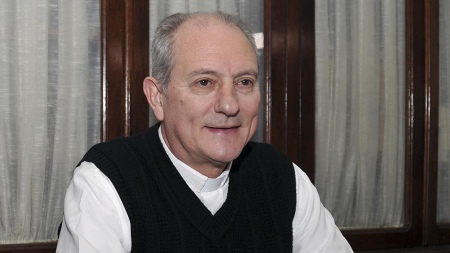Bishop Jorge Lugones, head of the Episcopal Commission for Social Pastoral Care, took up this Sunday the words of Pope Francis about his concern about poverty and the effects of inflation in Argentina and warned that it is “a structural issue that, obviously, It responds to multiple causes, but it affects the poorest sectors more strongly”.
Monsignor Lugones defined it as “a central concern” on which “We have already spoken on different occasions and social forums on these issues that make life and social coexistence among us” and added that “not only do they concern us, but, to the extent that we can, we are taking care of it from our Cáritas, with ‘immediate help’ and with projects for human and social promotion”.
after highlighting “the formation and accompaniment of neighborhood cooperatives and mutuals in the Buenos Aires suburbs”, referred -in statements to the newspaper La Nación- “to the accompaniment of social movements such as Caretakers of the common home that accompanies, contains and forms from ‘Laudato si’ on the care of nature and the discarded of society, with training for care, for young people in psycho-social vulnerability, which is already in eighteen provinces. Only in Jujuy there are more than seven hundred young people and only half of these have a care plan”
From the Diocese of Lomas de Zamora, in the province of Buenos Aires, for which he is responsible, he underlined the concerns that the Supreme Pontiff points out to his bishops: “The lack of dialogue, the social disagreement, insists on the care of the poor , in the criteria that he proposes in ‘Fratelli Tutti’: universal fraternity and social friendship and in ‘Let’s dream together’: creativity to bridge the gap between older adults and young people, the mission in the existential peripheries and in the neighborhoods, creativity to announce the gospel Discern together through what the church calls: the signs of the times: The Spirit shows us new things, this allows us to understand the meaning of the changes… by praying about these events and trends in the light of the Gospel , we can detect the motions that reflect the values of the God Realm and its opponent.”
As head of the Social Pastoral Ministry of the Catholic Church, Lugones knows the impact that poverty has on the most vulnerable sectors, so he took up the sayings of the Pontiff and explained what should be done to change this reality: “As Francisco analyzed, The increase in structural poverty over the years, which recognizes, among other causes, deindustrialization and concentration in large cities, calls for public policies that come out of short-termism, with agreements from all sectors involved in the world of work“.
In that order, Lugones emphasized the need to provide training to the population in the “new trades of the future, the software industry, and labor reconversion programs,” for which he considers essential “updating all the educational programs from primary to secondary, that incorporate the new technological paradigm and a population decentralization program, as proposed by ‘March to the countryside’, a project presented in the Chamber of Deputies”.
“Artisan work is required to overcome this difficult macroeconomic situation and to take advantage, in an environmentally sustainable way, of the energy, mining and agro-industrial potential to export in a global situation, where this demand appears precisely in the indicated post-pandemic and war situation” , defined the Bishop and added that “more jobs and better pay” are needed.
But he recognizes that Argentina has great difficulties in facing these challenges on its own, for which reason he stated that “South American and eventually Latin American integration is key, and the perspectives offered by an international policy, exercised from the different regional spaces (Mercosur, Unasur, for example) to find ways to increase bargaining power in the world”.

Regarding the impact of inflation in Argentina, although he maintained “that unlike other times, today it is also a global problem, in our country it is seen as a structural issue that, obviously, responds to multiple causes, but affects the poorest sectors more strongly”and pointed out “the non-existence of an industrial engine in the country since 1976, which is a generator of foreign currency, systemically caused there to be a shortage of dollars year after year, due to low-level manufacturing exports, this added to the permanent deficit that is covered by a monetary issue sustained over the years and without sufficient support from the central bank, to maintain the exchange rate, which causes a volatility of the dollar that leads to the adjustment of prices in all other goods of the economy and ends up reflected in the inflation rate which, as we said, mainly affects the most vulnerable sectors of society”.
In turn, Lugones highlighted that “We are convinced that the Homeland is everyone’s task, especially at this time in our country and in the region, since we are witnessing a permanent incitement to hatred and disagreement, which prevents us from recognizing ourselves as brothers and taking transcendent steps in terms of unity”, and recalled that Francisco says that from the crisis comes out risking and taking the hand of the other, to warn about “rarefied climate due to the internal divisions of the main coalitions, a desire for leadership appears from various candidates, without the will to reach consensus to generate a future governability, be it of the partisan color that be”.
“In the same way, discouragement is seen in many people who disbelieve in politics, with a certain polarity between tension and laziness or apathy,” said to emphasize that “it is necessary to defend the democratic systembearing in mind that the administration of life in society is not only the task of political power, but is also conditioned by other powers, such as the judicial or economic powers, and that it is everyone’s task to take care of the sovereign will of the people”.
Within this framework, Monsignor Lugones also observed the progress of the government’s economic management, inequality and external indebtedness: “In the global scenario generated by the Covid pandemic and the current war in Europe, although growth in economic activity is verified or in employment, there are still an unacceptable number of brothers in poverty. We are concerned about the data on economic inequality in our country, the way in which the excessive concentration of wealth in a few hands discourages national employment, stimulates savings abroad, foreign consumption and foreign currency flight. Furthermore, as the Pope says, foreign debt is a condition of development.”
In his analysis, the policies promoted by the State were not left aside, in particular the social plans that he said “are necessary in the current situation, until the consolidation of sustainable popular economy models, but that a true Development plan is essential. Human Integral that includes a project to repopulate our country to prosecute the anguishing need for land, shelter and work that a large part of our people have”.
“In this process, some plans are going to have to last over time as a means of support for those who have no other outlet or other resource,” said Lugones, but he pointed out that “it is essential that they not be administered discretionally, so that those sectors that are not associated with large movements are not left without coverage”, and although he understands that steps are being taken to reconvert these plans into genuine employment “it will demand great joint efforts because it is essential to consolidate a model that puts production to speculation, distribution to concentration and hoarding, the common good to sectoral profitability, which can only be achieved through a serious and profound social and political agreement”.
Lastly, to reflect on the current tension between the ruling party and a sector of the Judiciary, Lugones recalled a brief passage from his recent homily at the patronal feast of Nuestra Señora de la Paz: “Walking Mother, like you, fill us with tenderness towards the in need of peace, not only tranquility, but the peace of coexistence, the peace that makes us responsible for all suffering and obfuscation of justice, justice too long awaited”, and affirmed that “it is painful to see the times of processes in justice for the poorest, as we bishops have said: too long awaited”…
To conclude that “dFrom the institutional and political point of view, these strong tensions between the ruling party and the opposition and also due to growing conflicts in each of those spaces that we have already mentioned, have prevented the establishment of the necessary agreements and thus have made it difficult for the State bodies to function: It has not been possible to appoint a new Supreme Court judge, nor the Attorney General, nor the Ombudsman, hundreds of judicial posts remain vacant and conflicts around the Judicial Council have multiplied. The truth is that our people perceive a justice that is far removed from their needs.”

















